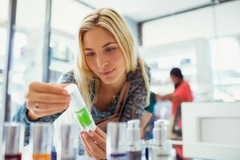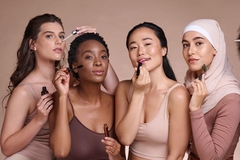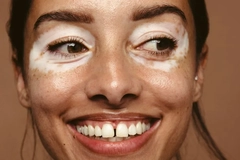California bill seeks to ban anti-aging skin care for minors after industry inaction

California, US, Assemblymember Alex Lee has introduced legislation to ban anti-aging products for minors in response to “Sephora kids” using skin care designed for adults. “Sephora kids” refers to the influx of Gen Alpha’s children and tweens purchasing and using adult anti-aging products despite the potential health risks.
“Over the last year, extensive media coverage and growing consensus among experts have highlighted the harm anti-aging products can cause to children,” Lee tells Personal Care Insights.
“Kids don’t need anti-aging products. The beauty industry knows that, and some companies have acknowledged the issue. But their statements — absent real and meaningful action — are performative and fall short of responsible behavior.”

The cosmetics industry markets and promotes products that promise desirable youthful, flawless skin. However, dermatologists and consumer safety groups warn that ingredients like retinol, glycolic acid, and vitamin C are too harsh for young skin and may cause irritation, rashes, and potentially long-term damage.
Despite growing concerns, the industry has largely failed to take meaningful action to curb the trend, prompting lawmakers to step in. Lee argues that his bill is a “common sense measure” necessary to protect children from being exploited by an industry that prioritizes profit over safety.
“Similar to other age-restricted products in California like spray paint, fireworks, and alcohol, retailers will be required to verify customers’ age before selling anti-aging products,” he says.
The product bans would include products containing vitamin A derivatives (including retinoids and retinol), alpha hydroxy acids (including glycolic acid, citric acid, and vitamin C), and other harsh ingredients.
Safety in a digital age
The rise of social media-driven beauty trends has led to an increasing amount of young consumers entering the skin care market. With the influence of digital advertising and beauty influencers, the industry has stepped into an era where marketing to children goes largely unchecked.
Many children, some as young as eight, have started mimicking adult skin care routines and purchasing anti-aging products meant for adults.
 The rise of social media-driven beauty trends has led to an increasing amount of young consumers entering the skin care market.According to a statement released by Lee’s office, US families with tweens aged 6–12 increased their skin care purchases by 27.2% in 2023, while those with teens aged 13–17 increased theirs by 28.6%.
The rise of social media-driven beauty trends has led to an increasing amount of young consumers entering the skin care market.According to a statement released by Lee’s office, US families with tweens aged 6–12 increased their skin care purchases by 27.2% in 2023, while those with teens aged 13–17 increased theirs by 28.6%.
This shift is alarming to medical professionals. The British Association of Dermatologists has warned that children using anti-aging skin care could face irreversible skin damage. Pediatric dermatologists at UCLA Health also stress that products containing retinol, peptides, and alpha hydroxy acids can be too intense for young, sensitive skin, leading to irritation, increased sun sensitivity, and other adverse effects.
Additionally, The Attorney General of Connecticut, in partnership with the Connecticut Children’s Medical Center, recently warned parents about anti-aging skin care being marketed to kids.
In response to the trend, Sweden’s largest pharmacy chain, Apotek Hjärtat, implemented an age limit for purchasing certain skin care products. However, no such restrictions currently exist in the US.
Retaliation and empty promises
Despite acknowledging the problem, the beauty industry has failed to enact meaningful safety precautions to prevent children from purchasing these products. In April 2024, the Personal Care Products Council (PCPC) released a statement recognizing that “anti-aging products are generally unnecessary for younger skin,” recommending that preteens only use mild cleansers, moisturizers, and sunscreen.
While the PCPC has publicly stated that it does not support children using anti-aging products, Lee argues that the statement is merely a symbolic gesture lacking real action.
“I’m disappointed that the PCPC’s statement last year blamed social media instead of taking responsibility for the industry knowingly selling these products to kids,” Lee tells us.
In a pushback effort against an industry that has profited from blurring the lines between necessity and marketing, the Assemblymember led a bipartisan group of 20 state legislators to challenge the statements.
In a letter to the PCPC, the lawmakers questioned what concrete steps beauty companies were taking to prevent children from accessing anti-aging skin care. The PCPC has publicly stated that it does not support children using anti-aging products.
The PCPC has publicly stated that it does not support children using anti-aging products.
Lee says the industry’s response was vague, failing to address concerns about marketing tactics that continue to target young consumers. “We have yet to see any commitment to action.”
Looking ahead
The new bill could face opposition from the beauty industry, which stands to lose a growing and profitable customer base. Additionally, enforcing an age restriction on skin care products could be challenging as online shopping increases accessibility.
Since neither the US FDA nor the European Medicines Agency require safety testing of anti-aging products on minors, lawmakers such as Assemblymember Lee, dermatologists, and pediatric health experts argue that state-level action is needed.
“With increasing awareness of the issue, I hope we can work together to protect children,” says Lee. “As I continue my legislative efforts, I’m open to hearing any constructive feedback from the industry.”













